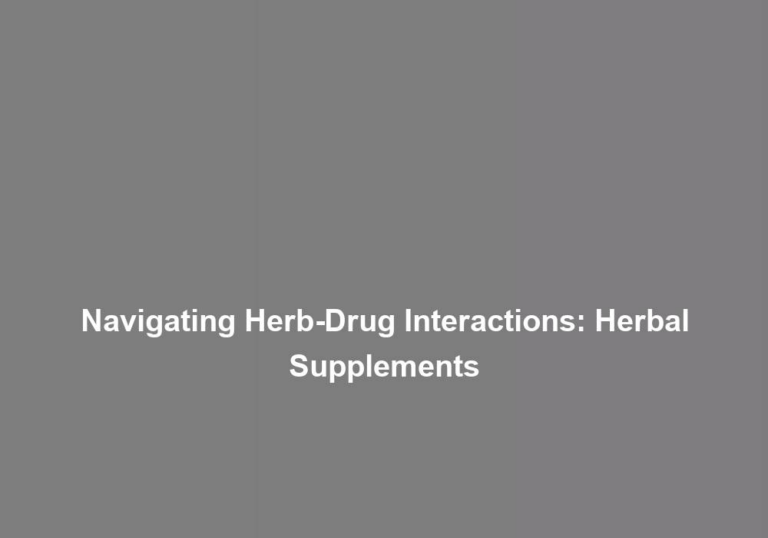Nature’s Remedies: Traditional Herbal Supplements
Looking for natural ways to support your well-being? Traditional herbal supplements have long been used to promote health and address various ailments. But how exactly do these remedies work, and what are the potential benefits? LetG??s explore the fascinating world of herbal supplements and their potential impact on your health.
History of Herbal Remedies
The history of herbal remedies can be traced back thousands of years to various ancient cultures and civilizations. Traditional practices of using plants and herbs for medicinal purposes have been passed down through generations, highlighting their cultural significance in societies around the world. Ancient wisdom recognized the healing properties of various plants and herbs, and these traditional remedies have persisted into modern times with their applications in alternative medicine and holistic wellness.
Ancient civilizations such as the Egyptians, Greeks, and Chinese documented the use of herbal remedies for a wide range of ailments. These practices were deeply intertwined with cultural beliefs and traditions, forming an integral part of their societies. The knowledge of herbal remedies was often held by specific individuals within the community, passing down their expertise to apprentices and ensuring the preservation of this valuable wisdom.
The cultural significance of herbal remedies is evident in the rituals and ceremonies of many indigenous communities. Plants and herbs are often used in spiritual practices, reinforcing their role in connecting individuals to their cultural heritage and traditions. This deep-rooted connection to nature and the healing properties of plants continues to resonate with people seeking a sense of belonging and connection to their ancestral roots.
Today, the ancient wisdom of herbal remedies finds modern applications in various forms such as herbal supplements, teas, and essential oils. As individuals seek alternative approaches to healthcare, the enduring legacy of herbal remedies continues to thrive in contemporary society, offering a sense of connection to traditional practices and cultural heritage.
Common Herbal Supplements
When considering herbal supplements, itG??s important to understand their potential benefits and risks. Common herbal supplements have been used for centuries and continue to be popular due to their perceived effectiveness and cultural significance. Here are some common herbal supplements that you may find beneficial:
-
Ginseng: Known for its adaptogenic properties, ginseng is believed to help the body adapt to stress and support overall well-being. It has been used in traditional herbal remedies for its potential to boost energy levels and improve cognitive function.
-
Turmeric: This vibrant yellow spice is a staple in many traditional Asian cuisines and is revered for its anti-inflammatory properties. Turmeric is often used in herbal remedies to support joint health and aid in digestion.
-
Echinacea: Widely used in Native American herbal remedies, echinacea is believed to support the immune system and help the body fight off common colds and infections.
-
Garlic: Garlic has a long history of use in various cultures for its potential cardiovascular benefits. It is often used in herbal remedies to support heart health and regulate blood pressure.
-
Milk Thistle: Known for its liver-protective properties, milk thistle is commonly used in herbal remedies to support liver function and promote detoxification.
These herbal supplements have stood the test of time and continue to be valued for their potential health benefits. Always consult with a healthcare professional before incorporating herbal supplements into your wellness routine.
Health Benefits of Herbal Remedies
Consider incorporating herbal remedies into your wellness routine to experience potential health benefits. Traditional practices have long utilized herbal traditions for their medicinal properties, and modern research is beginning to validate these age-old beliefs. Herbal remedies have a global impact, with diverse cultures harnessing the power of plants for healing purposes. There are numerous health benefits associated with herbal remedies that you may find appealing.
First and foremost, many herbal remedies are known for their anti-inflammatory properties. For instance, turmeric has been used in Ayurvedic medicine for centuries to reduce inflammation and may support joint health. Additionally, herbal supplements such as ginseng and ashwagandha are renowned for their adaptogenic properties, which may help the body adapt to stress and promote overall well-being.
Furthermore, herbal remedies often contain antioxidants that can help combat oxidative stress and support cellular health. For example, green tea is rich in catechins, potent antioxidants that have been linked to various health benefits, including improved heart health and reduced risk of certain chronic diseases.
Moreover, some herbal traditions include the use of plants like garlic and ginger, which have been associated with immune-boosting properties. These natural remedies may help support your immune system and promote resilience against common illnesses.
Incorporating herbal remedies into your wellness routine allows you to tap into the wisdom of traditional practices while benefiting from the findings of modern research. Whether itG??s managing inflammation, combating oxidative stress, or supporting your immune system, herbal remedies offer a natural approach to promoting overall health and well-being.
Incorporating Herbal Supplements Into Daily Life
You can start incorporating herbal supplements into your daily routine by understanding their benefits, following recommended daily dosages, and being aware of potential side effects. ItG??s important to consider how herbal supplements can support your overall health and well-being, and to ensure that you are taking them in the proper amounts. Additionally, staying informed about any potential side effects can help you make informed decisions about which supplements to incorporate into your daily life.
Benefits of Herbal Supplements
How can herbal supplements enhance your daily wellness routine? Incorporating herbal supplements into your daily life can offer various benefits, contributing to your overall well-being and vitality. Here are some ways herbal supplements can positively impact your daily routine:
- Enhanced Immune Support: Certain herbal supplements, such as echinacea and elderberry, are known for their immune-boosting properties.
- Improved Digestive Health: Herbal supplements like ginger and peppermint can aid in digestion and alleviate discomfort.
- Stress Reduction: Adaptogenic herbs such as ashwagandha and holy basil may help manage stress and promote a sense of calm.
- Natural Energy Boost: Herbs like ginseng and maca root are believed to provide a natural energy lift without the crashes associated with caffeine.
- Support for Mental Clarity: Some herbal supplements, like ginkgo biloba, are thought to enhance cognitive function and mental acuity.
Incorporating these herbal supplements into your daily regimen can help you achieve a holistic approach to wellness.
Daily Dosage Recommendations
Incorporating herbal supplements into your daily routine requires understanding the appropriate daily dosage recommendations to maximize their benefits without overuse or potential side effects. ItG??s essential to note that herbal supplement effectiveness is often based on research and varies depending on the individualG??s health status. Additionally, itG??s crucial to consider potential interactions with medications to prevent adverse effects. Below is a table to guide you on the recommended daily dosages of some common herbal supplements:
| Herbal Supplement | Recommended Daily Dosage |
|---|---|
| Echinacea | 300-500 mg |
| Turmeric | 500-1000 mg |
| Ginseng | 200-400 mg |
| Garlic | 600-1200 mg |
Ensure to consult with a healthcare professional before incorporating herbal supplements, especially if you are on medications, to avoid any unwanted interactions.
Potential Side Effects
When incorporating herbal supplements into your daily routine, itG??s important to be aware of potential side effects that may arise. While herbal supplements offer numerous benefits, itG??s crucial to consider the potential risks and long term effects they may pose to your health. Here are some important points to keep in mind:
- Herbal supplements may interact with prescription medications, leading to adverse effects.
- Some individuals may experience allergic reactions to certain herbs, causing skin rashes or respiratory issues.
- Long term use of certain herbal supplements may impact liver and kidney function.
- Excessive intake of certain herbs may lead to digestive issues such as diarrhea or nausea.
- Herbal supplements may contain varying levels of active ingredients, leading to unpredictable effects.
Being mindful of these potential side effects will help you make informed decisions when incorporating herbal supplements into your daily life.
Safety and Quality of Herbal Supplements
Ensuring the safety and quality of herbal supplements is a crucial aspect of consumer health and wellness. Regulatory standards and quality control are essential to guarantee that herbal supplements meet certain criteria for safety and effectiveness. Clinical trials provide valuable insights into the potential benefits and risks of herbal supplements, helping to determine their safety and efficacy. ItG??s important to be aware of potential adverse reactions and interactions with other medications or health conditions.
When considering herbal supplements, itG??s essential to look for products that have undergone rigorous quality control measures. A reputable manufacturer will adhere to regulatory standards and conduct thorough testing to ensure the purity and potency of their products. To make an informed decision, consider the following factors when evaluating the safety and quality of herbal supplements:
| Safety and Quality Factors | Description |
|---|---|
| Regulatory Standards | Look for products that comply with established regulatory standards to ensure safety and quality. |
| Quality Control | Choose supplements from manufacturers that implement stringent quality control measures throughout the production process. |
| Clinical Trials | Prioritize supplements that have been subjected to clinical trials to assess their safety, efficacy, and potential side effects. |
Future of Herbal Remedies
To stay informed about the evolving landscape of herbal remedies, itG??s crucial to consider the potential impact of regulatory advancements and emerging research on safety and efficacy. The future of herbal remedies is exciting and holds great promise for those who value natural health solutions. Here are some key considerations for the future of herbal remedies:
-
Integrating Technology: As technology continues to advance, herbal remedy producers are finding innovative ways to integrate technology into the cultivation, processing, and distribution of herbal supplements. This can lead to improved quality control, sustainability practices, and increased accessibility for consumers.
-
Sustainability Practices: With a growing awareness of environmental impact, the future of herbal remedies will likely see a focus on sustainable sourcing and production methods. Consumers are increasingly interested in products that are ethically and responsibly sourced, and herbal remedy producers are responding by embracing sustainable practices.
-
Personalized Herbal Remedies: Advancements in research and technology are paving the way for personalized herbal remedies tailored to individual needs. This could involve genetic testing, personalized formulations, and targeted herbal supplements based on specific health goals.
-
Evidence-Based Research: The future of herbal remedies will continue to be shaped by evidence-based research, providing a clearer understanding of the safety, efficacy, and potential interactions of herbal supplements.
-
Regulatory Advancements: As the herbal supplement industry evolves, regulatory advancements will play a crucial role in ensuring quality, safety, and transparency for consumers. Stay informed about regulatory changes to understand the evolving landscape of herbal remedies.
Conclusion
So next time youG??re strolling through a lush, green meadow, take a moment to appreciate the power of natureG??s remedies. From soothing teas to healing ointments, traditional herbal supplements have been used for centuries to promote wellness and vitality. By incorporating these natural remedies into your daily routine, you can tap into the ancient wisdom of plants and experience the incredible benefits they have to offer. Embrace natureG??s healing touch and thrive in harmony with the earth.







